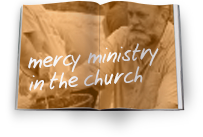How Mercy Serves Evangelism in the Church
Many American churches have separated mercy and evangelism.
Some congregations think that showing kindness to those in need is a good thing in its own right, and Christians should not feel compelled to evangelize in order to legitimize their deeds of mercy. In fact, some would go so far as to say that using mercy as a doorway to evangelism is disingenuous.
Other congregations rightly believe that evangelism is the most important act of mercy that we could possibly undertake for our neighbor, but they wrongly conclude that other kinds of mercy are optional or unnecessary.
It is my contention that churches should not separate the proclamation of the gospel from deeds of mercy. If a congregation is passionate about showing kindness to the poor, it must acknowledge that our greatest poverties are spiritual ones, and that the best bread we can give away is the Bread of Life. But if a congregation is particularly passionate about evangelism, they must also recognize that God has not made us disembodied spirits. So, in order to love our neighbor as Jesus commands, we should, as we are able, address their practical needs as well. After all, the Good Samaritan didn’t give the injured man a gospel tract, he bandaged his wounds.
HOW CAN MERCY SERVE EVANGELISM?
While mercy ministry can detract from evangelism, there are many ways in which mercy actually serves, and creates opportunities for, evangelism and disciple-making. Here are five of them.
1. Deeds of mercy demonstrate the character of Christ.
An important part of our evangelistic witness is showing unbelievers the excellence of Christ, and one of the most beautiful aspects of our Savior’s character is his kindness to those in need (e.g., Luke 7:13). When we show love and compassion to those in need, we display Christ’s compelling love and character.
2. Deeds of mercy show the power of the gospel to change us.
Similarly, when we help our neighbor we give evidence that our message is true. If we claim that the gospel has the power to change lives, then our mercy is one thing that proves it.
In a world where most people keep to themselves and only take care of their own, Christians have an opportunity to stun others with our inexplicable love and selfless service. We want people to be perplexed by our care so that they realize the only explanation is that Christians have been genuinely transformed by the good news.
3. Deeds of mercy model a pattern of discipleship.
The Great Commission calls us to make disciples and teach them to obey all that Jesus commanded (Matt. 28:18-20). When Christians obey the Lord’s instructions to love our enemies and be sacrificially merciful to our neighbor, we model what is meant by the call to take up our cross and follow Jesus. The recipients of our mercy are invited to join us in a life lived in submission to the Savior.
4. Deeds of mercy acknowledge the human condition.
As we observed above, God created humans as physical beings. The state of our flesh greatly impacts our lives. Life is more difficult when we are hungry, cold, intoxicated, sick, or in danger. And so evangelistic proclamation that doesn’t recognize the physical factors at work in the lives of its hearers risks being tone-deaf and insensitive.
It’s important that we recognize that there is an order to our needs, and that sometimes our greatest needs are not our most immediate needs. So we can say with confidence that the greatest need of every human being is to be reconciled to God through faith in Christ. But if someone comes to your door with a gaping head wound, that need, though lesser, is more urgent. First you must take care of the head wound, and then you should share the gospel.
5. Deeds of mercy generate opportunities to share the gospel.
There’s an old saying: if you want a friend, be a friend. We all like to be around people who are kind to us, who take an interest in our lives, and who demonstrate a desire to help us. So, showing practical care to others is an easy way to build bridges into your community.
We should all be sharing Christ with the people whose lives naturally intersect with ours, such as neighbors, friends, and co-workers. But moving towards needy people with deeds of mercy provides opportunities to build relationships with those with whom we might not otherwise come into contact.
Here are a few examples from the congregation that I serve as pastor:
- A food pantry provides groceries to hundreds of needy people. These people hear the gospel when the food is distributed, they begin to build relationships with people in the church, and they are asked if they’d like a visit in their home to talk about the Bible.
- A group of homeless people are invited into a church member’s home for a weekly dinner and Bible study. They receive a meal that’s better than the food in the shelter, a chance to be in a home, a relief from the monotony of daily life on the streets, and the opportunity to build friendships and be treated with dignity. Over time they are challenged to respond to the gospel and to begin to integrate into the life of the church.
- A group of at-risk teenagers are hosted at the church each week. They get a meal, a chance to hang out with their friends in a safe environment, and an opportunity to build relationships with positive adult role models. Each week they hear a lesson from the Bible that presses the gospel into their lives.
- A family provides foster care to a teen who has been sexually abused. They welcome her into their family, provide her with safety and shelter, and begin to point her to Christ.
In each of those situations, the act of mercy initiated the contact with the person who needed the gospel. Without the initial step of care and love, there would not have been an opportunity to share Christ.
STRIVE TO DO GOOD TO ALL—ESPECIALLY ETERNAL GOOD
In short, we pit evangelism and mercy against each other to our own detriment. Instead, one way they complement each other is that mercy serves evangelism. So we should strive to do good to all men (Gal. 6:10), especially that we might do them eternal good.









